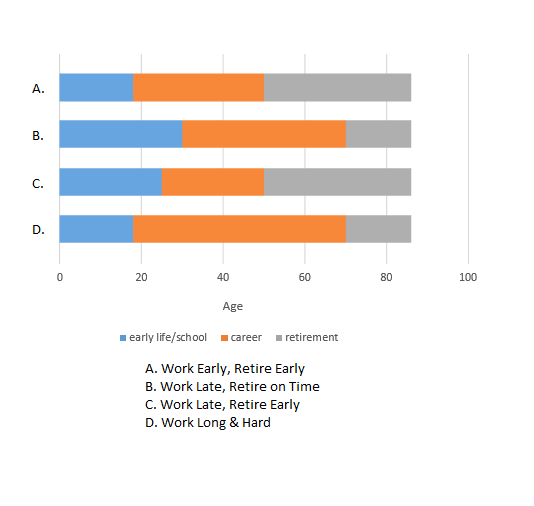Look at this from the top down as well as the bottom up. First, let’s get the stats out of the way.
Life expectancy in the US for females is 84y and for males is 80y, and there aren’t many octogenarians in practice. The average age of retirement for physicians is 68y. We can’t do much about choosing when we die but we do have a little choice when it comes to retirement. If things go well and we are healthy, competent and have the motivation, means and desire we could practice to the age of 70. Or we could give it up at 50 and go sailing, or whatever. So, we are looking at a career, including preparatory training, that may span 50 years. Consider that the FBI and other law enforcement and public service jobs have mandatory retirement at age 57, shortening the career span by up to 13 years.
The average medical career is 31-36 years. That leaves a 14-19 year span that could be outside the training-career. That span could be at the beginning, the end or divided in any way between them.
We don’t have much choice as to when we start elementary school, either. Grade-wise, it is pretty much at age 6y. School in the US is 12 years to graduate from High school. Ergo, we assume that most career oriented individuals will start college at 18. But that is not always the case. Take, for instance the following chart of 4 different paths to a medical career.

But life happens, right? So, what about life and commitments outside of our career? The search for romance, possibly marriage and children? What about dependent adults, or unexpected illness? Our parents don’t live forever and who knows what our genetics or fate has in store for us?
Some examples.
I was 24 when I entered college, 28 when I entered medical school, and 36 when I finished residency. During that time I got married and had 2 children. I’ve had a 31 year career, so far.
One of my students, who was married, was accepted to medical school shortly after having her first baby. Her husband was just graduating from residency and moved 300+ miles across the state. She raised the baby, breast fed and graduated to join her husband where he had established his practice.
One of my current colleagues started medical school at 22 with 2 children and had 2 more during residency.
Another of my colleagues worked as a roust-a-bout in the oil field after high school. He decided to improve things and trained and worked as a Paramedic. He liked the medical aspect of things and returned to college and ended up in medical school.
It can be and is done all the time. I’m not saying the path may or may not be easy, mine was. But, it is certainly doable.
How does the nuclear family, extended family and/or support system affect our decision in career choice? Clearly, the better the support one has the easier the process will be. But, if one knows ahead of time that there will be no support, then they can plan appropriately. It is probably wise to do so, anyway. There may need to be some introspection to see how one might measure up under less than ideal circumstances. Don’t do it alone, though. Friends, family and even less close acquaintances can often give advice on our character that we aren’t consciously aware of.
In military vs civilian career paths, the major difference I see between them is that the military is more likely to uproot you and move you overseas. Moving from one base to another is generally guaranteed in the military but occurs in civilian life as well. For instance, jobs are lost or unsatisfactory. Maybe you move up the career ladder, requiring a move. Maybe you have to move to be close to elderly parents that need help? Hierarchy, chain of command, and protocol don’t differ that much. The pay difference is primarily seen at the last half of the career, less so in the beginning. Military careers have hidden benefits the civilian side doesn’t get. By that time the military physician has accepted the financial lot in life he/she is dedicated to a career in the military, anyway.
Time waits for no one. So, if you are planning on having a family, don’t put it off “just because” of pending school or training. Instead, plan inclusive for school or training. The school or training facility cannot discriminate against you because of your starting a family. Of course there will be a delay in your training, but it is a situation that can be done. We have all heard about the situation where things get put off and put off until it is too late. It isn’t a matter of being too old, it is a matter of not planning ahead.
Resilience vs naiveté. Remember that a plan is perfect up until the second it is put into place. At that second, fate stirs it with it’s wiggling little finger and changes have to be made. An unexpected pregnancy, a parent dies leaving a family mess or one encounters an unexpected illness. A change in plans is needed, but not necessarily capitulation.
What about being too young to go to medical school? The prodigy who graduates from high school, or even college, at 16 and gets into medical school. What life experiences do they have for a foundation on which to base advice for life-changing or life and death issues? What maturity do they bring to the table? Despite similar concerns, the prodigy do exist.
As well do those too old.
Your Uncle Dave
Weary
Acknowledgements
This post was inspired by BimmerGirl and Gunny Angel.
BimmerGirl provided the graphics.